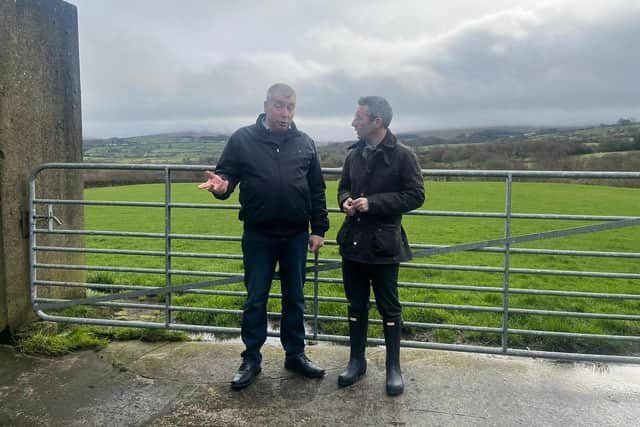UFU host DAERA Minister on sheep farm
and live on Freeview channel 276
Running an upland flock, Mr Lynch spoke with the minister about the absence of critical sheep support within the new future agriculture policy. He also highlighted other key issues impacting the Northern Ireland sheep sector.
Speaking afterwards, Mr Lynch said: “We were delighted to have DAERA Minister Andrew Muir out on farm this morning for a visit.
Advertisement
Advertisement
“A critical discussion point was support for sheep farmers. Currently, sheep is not included in future agriculture support and because of this, I am set to lose 17% of my Basic Payment Scheme (BPS) which I will not get back, as there is no scheme specifically for sheep and I do not farm crops or cattle.


“There are many farmers across NI in the same situation and it is extremely worrying.
“To date the majority of farm incomes including sheep, are made up of essential support in the form of BPS because the money made from food production alone would not be enough to sustain a farm business.
“To lose 17% of that is huge and will put significant financial pressure on sheep farms. To not have a sheep scheme under the new ag policy in similarity to what has been delivered for the other commodities, has really impacted sheep farmers’ mentality and future outlook. Meanwhile in ROI, sheep farmers are supported through the Sheep Improvement Scheme and are set to receive €20 per ewe.”
Advertisement
Advertisement
During the visit, the UFU presented the report, ‘A Vision for the Development of the NI Sheep Industry’ produced by the NI Sheep Industry Taskforce in 2022.
In that same year, the value of the sheep industry’s output was £106 million.
“Sheep farmers have some of the lowest farming incomes with many having to work off-farm, yet they still make a significant contribution to the NI economy and local communities and are critical for preserving the landscape,” Mr Lynch continued.
“In upland areas, the land is only suitable for grazing sheep, enabling us to turn grass into quality food products.
Advertisement
Advertisement
“The crucial work of our sheep farmers needs to be valued so that the next generation will have the confidence to invest in this commodity and rural communities in upland areas can thrive.
“The proposals in the sheep report would support farmers to continue this work and do more, by rewarding them for carrying out activities that improve sheep health and welfare. This will increase productivity and overall sustainability of sheep farms while also helping to reduce greenhouse gas emissions.”
Mr Lynch demonstrated the importance of sheep genetics and data recording during the DAERA Minister’s visit.
“I use a digital recording system to ensure that only the most productive and profitable ewes are maintained on the farm,” he said. “In ROI and Britain there are programmes in place for sheep genetics.
Advertisement
Advertisement
“We need a sustainable ruminant genetics programme for sheep in NI alongside critical sheep support.
“During the minister’s visit we also discussed the usage of wool.
“Farmers pay more to clip the sheep than they receive as a return, however, it must be shorn for the health and welfare of the animal.
“Wool is a very sustainable product with so much potential, but it too is undervalued. We need to be driving wool innovation as it has so many uses.
Advertisement
Advertisement
“Overall, the minister’s enthusiasm and interest in the sheep sector was very encouraging.
“We will continue to lobby for essential support for the sheep sector, and we look forward to working with him to ensure the importance of our family sheep farms is recognised and that they have a viable future.”